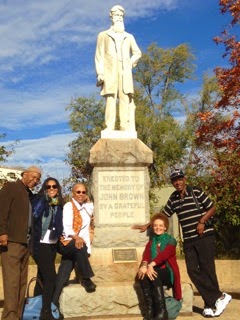 |
| (PHOTO: A3 supporters gather in support of Albert Woodfox) |
Please join us on the morning of Wednesday, October 29th, at the US Court of Appeals for the 5th Circuit (600 Camp St.) in New Orleans for oral arguments about whether or not to uphold Judge Brady’s January 2014 ruling that put an end to the invasive, dehumanizing strip and cavity searches Albert had been tortured by since May of 2013.
As you may remember, this is the second of two outstanding appeals of rulings in A3’s favor that have frozen progress towards the final trial prep stages of the decade long A3 civil case, which seeks to establish long term solitary as the unconstitutionally cruel and unusual punishment the A3 know it to be.
The cruel and rather perplexing irony of this corner of the civil case is that it was a lawsuit that Albert himself filed and won in 1978 that put an end to the demeaning practice for decades, until two months after his conviction was overturned for a 3rd time. It was then that prison officials at David Wade Correctional Center, where he is currently being held, inexplicably began to again routinely strip and cavity search Albert every time he left or entered his cell, even if he was shackled and had no contact with anyone besides prison officials.
In his ruling, Judge Brady found that these frequent, routine searches were not shown to be “necessary” or “justified” for security as is required constitutionally of such policies, and therefore “Woodfox’s human dignity [as] protected by his Fourth Amendment rights” outweighed any “legitimate penological interest.” The State disagrees and is fighting to reinstate the searches.
If you are in town and able to attend, the proceedings are open to the public. Doors open at 8am and court convenes at 9am in the West Courtroom, room 265. Although listed second on the schedule for the morning, there is no telling the exact time our case will begin, so it is better to arrive early, but be prepared to potentially stay all morning. Arguments themselves are expected to be very short–30 minutes or less per side. Seating is limited, and formal dress and conduct are both required and strictly enforced by Federal Marshals.
For those unable to attend, the hearing will be recorded by the Court and we will circulate a link to the proceedings as it becomes available.
13 Days in the Dungeon – Albert’s New Civil Suit
Last week Albert filed another civil action, separate from the larger A3 civil suit, seeking to hold the Louisiana DOC and prison officials at Elayn Hunt Correctional Center (which you may remember as the prison where Herman spent his last years) to account for the 13 harrowing days he spent in the dungeon there before, during, and after his May 2012 habeas hearing in Baton Rouge.
Officials ignored all transfer, classification, and disciplinary procedures required to justify such a harsh placement, and put Albert in the dungeon shortly after he arrived for the 3 day hearing that months later would result in his conviction being overturned for a 3rd time. When Albert objected to the punitive placement without due process or review, he was told: “this decision comes from higher up.”
Albert’s complaint details multiple egregious violations of his 1st, 8th, and 14th Amendment during his stay at Hunt. In addition to denying him access to yard time, TV, phone, visits, canteen, and confiscating the basic clothes and hygiene products he was allowed to bring with him; Albert was served inedible food, including at least one meal served still frozen in a block of ice, and forced to wear leg shackles without socks which caused severe cuts and bruises on his ankles that took months to heal. Most importantly the harsh conditions, extreme heat, and continuous screaming and moaning from other inmates tortured by their punishment in dungeon cells nearby, prevented Albert from participating fully in the hearing that would determine his freedom, resulting in significant mental and emotional anguish on top of the very real physical suffering he endured.
We will keep you updated as this important new challenge moves along through the courts.
Robert King Joins BPP Celebration in Kansas City

Last week, a Black Panther Party Legacy Celebration was held in Kansas City.
Organized by Its About Time BPP, the range of activities included a panel entitled “The Reality of Political Prisoners in America,” which featured Robert King alongside Yasmeen Sutton and Charlotte O’Neal.
Featured in the photo above, taken next to the statue of John Brown, from left to right are: Robert King, Yasmeen Sutton, Barbara Easley Cox, Kathleen Cleaver and Clark Bailey.
Cyclists go from NOLA to Angola to keep incarcerated families connected
The Advocate reports that earlier this month, Forty cyclists departed from Orleans Parish Prison for:
The Louisiana State Penitentiary at Angola, a three-day trek designed to raise money for a bus service that allows families to visit loved ones in the state’s prison system. The 170-mile trip underscores the point that the fourth annual “Nola to Angola” ride is trying to make: If you think it’s far on a bike, imagine the gulf for the thousands of inmate relatives in the New Orleans area who don’t have a car to make the drive.
“It draws attention to that distance because when people hear about it, they’re so incredulous: ‘You bike all that way?’ ” said Nicky Gillies, one of the ride’s organizers. “But it really makes a point about the separation.”
Gillies said Orleans Parish Prison has many inmates who were arrested on nonviolent offenses but who have to remain in jail because they cannot afford to post bond while they await trail. As the state’s high incarceration rate takes its toll on inmates’ lives and their communities, she said, the downward spiral that often begins at the entry level of the prison system can end with offenses that lead to life sentences at Angola.”We really want to highlight the connection,” she said.
Gillies said people interested in donating to the cause can do so through the group’s website, nolatoangola.org, because the ride is essentially an event to draw attention to the year-round bus rides program. She said the bike riders pay a registration fee and supply their own food, so all of the money donated goes to the cause.
Pope Francis Speaks Out Against the Death Penalty, Lifetime Sentences, the Isolation of Maximum Security Prisons and More
Pope Francis recently issued a harsh critique of prisons and the widespread human rights violations resulting from them all around the world. “All Christians and people of good will are thus called today to struggle not only for abolition of the death penalty, whether it be legal or illegal and in all its forms, but also to improve prison conditions, out of respect for the human dignity of persons deprived of their liberty. And this, I connect with life imprisonment,” he said. “Life imprisonment is a hidden death penalty.”
Furthermore, in what can be interpreted as a critique of solitary confinement, he said maximum security prisons can be a form of torture, since their “principal characteristic is none other than external isolation,” which can lead to “psychic and physical sufferings such as paranoia, anxiety, depression and weight loss and significantly increase the chance of suicide.”
Pope Francis said contemporary societies overuse criminal punishment, partially out of a primitive tendency to offer up “sacrificial victims, accused of the disgraces that strike the community.” He denounced a growing tendency to think that the “most varied social problems can be resolved through public punishment … that by means of that punishment we can obtain benefits that would require the implementation of another type of social policy, economic policy and policy of social inclusion.”
Read the full article here.
Gather
© 2014 by Alice Walker
for Carl Dix and Cornel West
It is still hard to believe
that millions of us saw Eric Garner die.
He died with what looked like a half dozen
heavily clad
policemen
standing on his body, twisting and crushing
him
especially his head
and neck.
He was a big man, too. They must have felt
like clumsy midgets
as they dragged him down.
Watching the video,
I was reminded of the first lynching
I, quite unintentionally, learned about:
it happened in my tiny lumber mill
town before the cows were brought in
and young white girls
on ornate floats
became dairy queens.
A big man too,
whom my parents knew,
he was attacked also by a mob
of white men (in white robes and hoods)
and battered to death
by their two by fours.
I must have been a toddler
overhearing my parents talk
and mystified by pieces of something
called “two by fours.”
Later, building a house,
i would encounter the weight,
the heaviness, of this varying length
of wood, and begin to understand.
What is the hatred
of the big black man
or the small black man
or the medium sized
black man
the brown man
or the red man
in all his sizes
that drives the white lynch mob
mentality?
I always thought it was envy:
of the sheer courage to survive
and ceaselessly resist conformity
enough to sing and dance
or orate, or say in so many outlandish
ways:
You’re not the boss
of me!
Think how many black men
said that: “Cracker,* you’re not the boss
of me;”
even enslaved. Think of how
the legal lynch mob
so long ago
tore Nat Turner’s body
in quarters
skinned him
and made “money purses”
from his “hide.”
Who are these beings?
Now we are beginning to ask
the crucial question.
If it is natural to be black
and red or brown
and if it is beautiful to resist
oppression
and if it is gorgeous to be of color
and walking around free,
then where does the problem
lie?
Who are these people
that kill our children in the night?
Murder our brothers in broad daylight?
Refuse to see themselves in us
as we have strained, over centuries,
to see ourselves in them?
Perhaps we are more different
than we thought.
And does this scare us?
And what of, for instance,
those among us
who collude?
Gather.
Come see what stillness
lies now
in the people’s broken
hearts.
It is the quiet force of comprehension,
of realization
of the meaning
of our ancient
and perfect
contrariness;
of what must now be understood
and done to honor
and cherish
ourselves:
no matter who
today’s “bosses”
may be.
Our passion
and love for ourselves
that must at last
unite
and free us. As we lay our sacrificed
beloveds to rest
in our profound
and ample caring:
broad, ever moving,
and holy,
as the sea.
*Cracker: from the crack of the whip wielded by slave drivers.
Keep in Touch with Albert:
Albert Woodfox #72148
David Wade Correctional Center
670 Bell Hill Road
Homer, LA 71040






